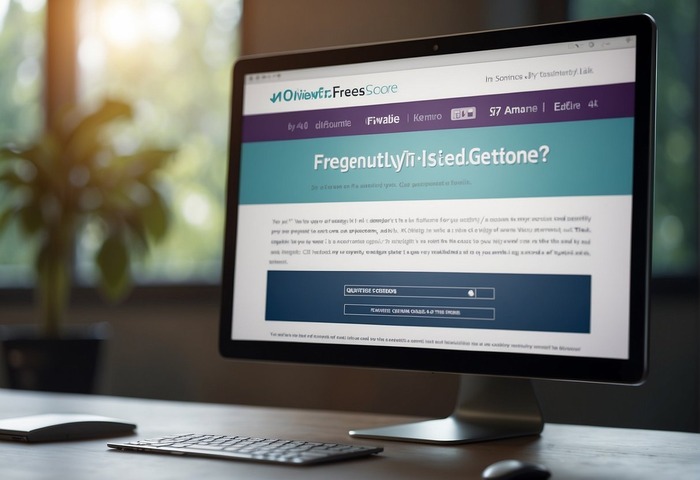Understanding your credit score is essential for managing your financial health. It is a critical factor that creditors and lenders evaluate when deciding whether to offer credit or loans. ViewFreeScore.com is a platform that caters to these needs by providing tools for accessing and monitoring credit scores and reports.
By obtaining your scores, you can be well-equipped to make informed decisions about credit and loans. Moreover, regular monitoring through services such as ViewFreeScore.com can alert you to changes in your credit status, helping you to detect fraud and inaccuracies swiftly.

Credit scores can vary across different reporting agencies, and it’s not uncommon for individuals to find discrepancies. Services like ViewFreeScore.com allow you to verify your identity and securely receive your scores online for immediate review.
They also highlight the importance of understanding that the scores they provide may be different from those used by lenders, which underscores the value of using such tools to access the full spectrum of your credit information.
Key Takeaways
- Knowing your credit score is fundamental to personal financial management.
- Regularly monitoring your credit report can help identify fraud early.
- Secure, online access to your credit scores helps maintain your financial well-being.
Understanding Credit Scores
Before diving into the particulars of credit scores, know that they are numerical representations of your creditworthiness, designed to help lenders assess the risk of lending to you.
Credit Score Fundamentals
Credit scores typically range from 300 to 850, with higher scores indicating a more reliable borrower. Two main types of credit scores are FICO Scores and VantageScores. The Fair Credit Reporting Act governs the use and accuracy of your credit information.
- FICO Score: Most commonly used by lenders, with a range between 300 and 850.
- VantageScore: Offers a similar score range, updated more frequently, and used by some free credit score services.
When you receive your free credit scores, you’re often looking at a version of one of these models. Your scores are based on the information in your credit reports from the three major credit bureaus: Equifax, Experian, and TransUnion.
Factors Influencing Credit Scores
Payment history, including on-time or late payments, forms a significant portion of your FICO Score. Lenders see your past payment behavior as a predictor of your future behavior.
Your credit utilization, or how much credit you’re using vs. how much you have available, especially on credit cards, is also essential. It’s recommended to keep this ratio below 30%.
Other factors include:
- Length of credit history: Longer is usually better.
- Credit mix: Diverse types of credit, such as credit cards, auto loans, mortgage, etc., can positively impact your score.
- New credit inquiries: Applying for too many new lines of credit in a short time can lower your score.
Understanding these elements helps you grasp how your financial actions affect your credit health and can guide you in making decisions that favor your credit score.
Navigating Credit Reports

Understanding your credit report is essential for managing your financial health. It can affect your ability to get a loan, a credit card, or even a job. Here we will look at the key components of a credit report and how to access them for free.
Components of a Credit Report
Your credit report is a detailed summary of your credit history, comprised of several key sections:
- Personal Information: This includes your name, address, Social Security Number, and possibly employment information.
- Credit Accounts: Lists all your loan and credit accounts, including the type of account (credit card, mortgage, etc.), the date you opened it, your credit limit or loan amount, account balance, and payment history.
- Credit Inquiries: Details when a lender has requested your credit report. This section is split into two types: “hard inquiries” which occur when you apply for credit and can affect your score, and “soft inquiries” which do not affect your score.
- Public Records: Shows legal matters like bankruptcies, foreclosures, suits, wage attachments, liens, and judgments.
Lenders, including names like American Express and Bank of America, report to credit bureaus such as Experian, TransUnion, and Equifax. These credit reporting agencies compile this information to create your credit report.
Accessing Free Credit Reports
Thanks to the Fair Credit Reporting Act (FCRA), you’re entitled to one free report from each of the three credit bureaus every 12 months, which you can obtain through AnnualCreditReport.com. Here’s how to get yours:
- Go to AnnualCreditReport.com.
- Fill in your personal information to verify your identity.
- Choose which credit reports you’d like from Experian, TransUnion, and Equifax.
Additionally, services like Credit Karma offer free access to your credit scores and reports, which can be updated as often as once a week. These services often use the VantageScore 3.0 model, which is a competitor to the FICO score model most lenders use.
You should regularly review your credit reports. This allows you to confirm that your personal information and financial data are accurate, and it helps in detecting any signs of fraud or identity theft. It’s also the first step in correcting any inaccuracies that could negatively impact your credit scores.
Credit Management Tools and Resources

Managing your credit effectively begins with understanding your credit profile and monitoring changes over time. The tools and services available through ViewFreeScore.com can help you keep a watchful eye on your creditworthiness and make informed decisions to improve your financial health.
Credit Monitoring Services
ViewFreeScore.com offers credit monitoring services that allow you to stay on top of your credit report and score. By signing up, you can receive alerts to significant changes that could indicate fraud or identity theft. Participating providers like Chase Credit Journey, Discover Credit Scorecard, and Citi’s myCredit Guide provide similar free credit monitoring solutions, which include regular updates to your score.
- Credit cards issuers: Several credit cards from brands like Chase, Citi, and Discover often offer complimentary credit monitoring features as part of their services.
- Consumer Financial Protection Bureau (CFPB): Recommends periodically checking your credit report, which you can do through the aforementioned services.
Improving Credit Health
Improving your credit health requires regular review and responsible financial behavior. Here’s how:
- Payments: Ensure timely payments on credit cards and loans to avoid negative impact on your credit score.
- Credit Utilization: Keep the balance low on credit cards; high utilization can lower your score.
Tools like Credit Sesame and Credit Karma offer insights on your financial habits that can affect your credit profile. They recommend personalized strategies, often leveraging educational resources provided by the Consumer Financial Protection Bureau, to enhance your understanding of how credit works and ways to improve it.
Practical Financial Products Information

Managing your finances effectively requires understanding the various financial products at your disposal. Make informed decisions about credit cards and loans to maintain a healthy financial standing.
Choosing the Right Credit Card
When exploring credit card offers, it’s essential to compare interest rates, credit limits, and terms. Credit card issuers like Capital One, U.S. Bank, and Wells Fargo offer a range of cards tailored to different needs. Factors to consider include:
- Rewards: Look for cards that offer cash back, points, or travel rewards that align with your spending habits.
- Fees: Be aware of annual fees, foreign transaction fees, and late payment charges.
- Interest Rates: Cards with lower APRs can save you money if you tend to carry a balance.
- Credit Risk: Your credit history affects your eligibility for specific offers, with better terms often available to those with higher credit scores.
Before submitting a credit application, ensure you’ve read the fine print to avoid unexpected bills and to maintain a positive credit history.
Understanding Loans and Mortgages
When you require funds for large purchases or expenses, lenders provide loans and mortgages with varied terms. Key aspects to consider include:
- Interest Rate: A fixed rate offers stability over time, while a variable rate may provide initial savings.
- Loan Term: Longer terms can mean lower monthly payments but more interest over the life of the loan.
- Insurance: Some lenders require insurance, like PMI for mortgages, which protects the lender in case you default.
Be mindful of how loans impact your credit. Missed payments can lead to collections, public records, or bankruptcies on your report.
- Mortgages: Essential for home buying, with options like fixed-rate, adjustable-rate, and interest-only mortgages.
- Auto Loans: Available for new and used vehicles, these include terms that vary based on your credit history and the car’s age.
- Student Loans: These aid in financing higher education and come with different repayment options post-graduation.
Consideration of each entity’s impact on your financial profile and credit score is vital. Keep your accounts in good standing to avoid issues like identity theft or negative entries. Remember, a robust credit score improves your terms and can protect you from overpaying due to high-interest rates.
Frequently Asked Questions
In this section, you’ll find answers to common queries regarding subscription management, account access, customer support, mobile app availability, refund procedures, and locating reviews for ViewFreeScore.

How can I unsubscribe from ViewFreeScore services?
If you decide to unsubscribe from ViewFreeScore, you can do so by contacting their customer service directly. Call them at (866) 460-2315, and they will guide you through the cancellation process.
What steps should I follow to log in to my ViewFreeScore account?
To log into your ViewFreeScore account, visit their website and locate the login section. Enter your registered email and password to access your financial profile and credit score information.
How can I contact ViewFreeScore customer service?
Reach out to ViewFreeScore customer service by dialing (866) 460-2315. Their representatives will assist you with any questions or concerns you might have.
Is there a mobile app available for ViewFreeScore, and if so, where can I download it?
Currently, there is no information available regarding the existence of a mobile app for ViewFreeScore. Check their official website for the latest updates on app availability.
What is the procedure to request a refund from ViewFreeScore?
The specifics about refund procedures are not provided in the search results. For accurate information on obtaining a refund, contact ViewFreeScore customer service.
Where can I find customer reviews and ratings for ViewFreeScore?
To find customer reviews and ratings for ViewFreeScore, look for feedback on their official website, trusted review platforms, or financial forums. This can provide insight into other users’ experiences with their services.
